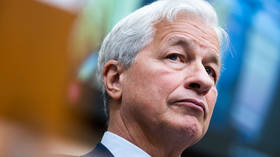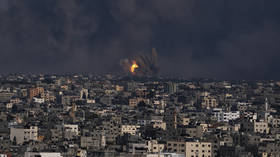JPMorgan boss warns of ‘the most dangerous time’

The continuing conflict between Russia and Ukraine coupled with the escalation of Israel-Palestine hostilities could have far-reaching consequences for the global economy and geopolitical relations, JPMorgan CEO Jamie Dimon wrote in the company’s third-quarter earnings report published on Friday.
Dimon said that despite the relative health of the US economy, the country has enough challenges to overcome, including a tight labor market, high government debt levels, the threat of further spikes in inflation and the longer-term consequences of quantitative tightening. However, the worsening geopolitical conditions could make the situation infinitely more difficult, he warned.
“The war in Ukraine compounded by last week’s attacks on Israel may have far-reaching impacts on energy and food markets, global trade, and geopolitical relationships. This may be the most dangerous time the world has seen in decades,” he stated.
Dimon told CNN on Friday that American bank executives are “climbing the wall of worry,” referring to one of the most famous Wall Street truisms that explains how markets can remain bullish amid economic uncertainty and geopolitical crises.
“We do a hundred stress tests a week… Usually, geopolitics presents itself as a deep recession or a mild recession… And markets doing well is not a reason ever to say they will continue to do well,” the CEO stated.
Another notable figure in global finance, Ray Dalio, founder of the world’s largest hedge fund Bridgewater Associates, earlier warned that the Israel-Palestine conflict may spread beyond the borders of the two countries, and have far-reaching consequences for the entire global community.
“In my opinion, this war has a high risk of leading to several other conflicts of different types in a number of places, and it is likely to have harmful effects that will extend beyond those in Israel and Gaza,” Dalio wrote in a LinkedIn post on Thursday, adding that “the Israel-Hamas war is another classic, unfortunate step toward a more violent and encompassing international war.”
The escalation of hostilities between Palestinian militant group Hamas, which controls much of Gaza, and the Israeli Defense Forces, has already caused a surge in global oil prices earlier this week. Analysts say the conflict could destabilize the Middle East, which accounts for more than one third of global seaborne trade, and exacerbate the existing oil supply deficit while sending crude prices skyrocketing.
For more stories on economy & finance visit RT's business section













